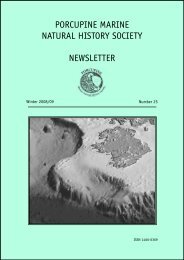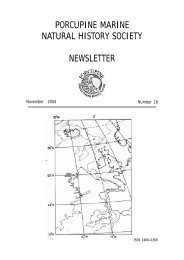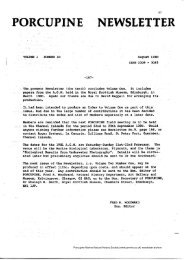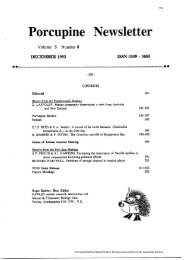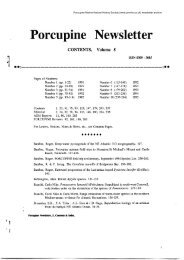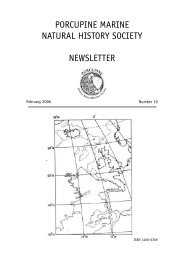PORCUPINE MARINE NATURAL HISTORY SOCIETY NEWSLETTER
PORCUPINE MARINE NATURAL HISTORY SOCIETY NEWSLETTER
PORCUPINE MARINE NATURAL HISTORY SOCIETY NEWSLETTER
You also want an ePaper? Increase the reach of your titles
YUMPU automatically turns print PDFs into web optimized ePapers that Google loves.
28<br />
formerly rich, meadow-like sea beds of shallow<br />
waters is extending.<br />
At the high ocean surface fishing may<br />
take several forms. Enormous curtain nets<br />
and long lines are set, catching fish and such<br />
unwanted creatures as turtles, dolphins and<br />
albatross. But should a net or line go adrift<br />
it will continue to fish indefinitely. And it<br />
is known that many species will congregate<br />
under floating objects in mid-ocean. I myself<br />
once observed over three hundred big dorado<br />
under a boat in midatlantic. Now let us suppose<br />
a log is floating freely in the tropics, far from<br />
shore. Fish, sharks, turtles congregate and<br />
then along comes a purse-seiner who sets his<br />
net and captures them all. How did the seiner<br />
know the location of the log? Well, he put it<br />
there himself a week before, complete with<br />
satellite transmitter. Many such logs are now<br />
adrift in the world’s oceans.<br />
The surface-dwelling oceanic white-tipped<br />
shark, once filling the photographs in Thor<br />
Heyerdahl’s book, “The Kon-Tiki Expedition”<br />
is now a rarity, cruelly slaughtered for its<br />
fins, a further example of the denudation of<br />
the ocean.<br />
Roberts repeatedly turns to unexploited<br />
fish populations to demonstrate their reduction<br />
due to fishing. He cites the cod stocks in<br />
Canadian Atlantic waters at the time of the<br />
arrival of John Cabot (1505) as standing at<br />
an estimated seven million tons, while by<br />
1992 there were but twenty two thousand<br />
tons left. His message is that the presumed<br />
baseline somewhere around 1900 is a severe<br />
underestimate of the unexploited condition<br />
of the oceans and that consequently the<br />
setting of maximum sustainable yields at the<br />
conventional level of half the primal condition<br />
leads to error. But he further suggests that<br />
all consideration of individual species alone<br />
is mistaken and that fisheries science should<br />
more resemble economics in its approach to a<br />
complex scene.<br />
Before his final conclusion Roberts<br />
lists seven desirable reforms to fisheries<br />
management. Let us list them:<br />
1. Reduce the amount of fishing.<br />
2. Eliminate risky decisions.<br />
PMNHS Newsletter No.24 Summer 2008<br />
3. Eliminate catch quotas.<br />
4. Require fishers to keep what they<br />
catch.<br />
5. Use the best available fishing technology<br />
to reduce bycatch.<br />
6. Ban or restrict the most damaging<br />
fishing gear.<br />
So far, so unexceptional. While much<br />
of this might be fought over by interested<br />
parties, none of these proposals is beyond<br />
discussion. It is the seventh proposal which<br />
is outstanding. It is:<br />
7. Implement extensive networks of<br />
marine reserves that are off-limits to<br />
fishing.<br />
The key word is “extensive”. We are not<br />
discussing here such small voluntary closed<br />
areas as that described by Richard Stanford in<br />
Lyme Bay (Porcupine Newsletter 15, 2004). In<br />
order to seriously affect fish stocks, very large<br />
areas would have to be closed off, something<br />
between twenty and forty percent of the<br />
world’s oceans. We may visualise this in the<br />
North Sea to give it scale. Roberts believes<br />
that fish numbers would gradually recover,<br />
that areas outside the reserves would yield<br />
more fish through outward migration and that<br />
less and different controls would be required<br />
of fishermen. However, his ideas are not fully<br />
accepted within the scientific community<br />
itself, but more importantly they will not be<br />
accepted by either fishermen or politicians,<br />
fishermen because they can still make a living<br />
from the sea and politicians because they will<br />
not yield the power of controlling fishing for<br />
immediate returns.<br />
We have had two major experiments of<br />
zero fishing over large areas and in each case<br />
fish stocks soared. They were called the First<br />
World War and the Second World War and both<br />
experiments were ignored.<br />
What then? Roberts is clear in his view.<br />
Without marine reserves he is convinced that<br />
marine life will continue its long slide towards<br />
jellyfish and slime. It is a gruesome prospect.<br />
His book is a valuable warning at a very<br />
affordable price and is well recommended.<br />
My thanks to Judy and Bob Foster-Smith<br />
for comments on the manuscript.



